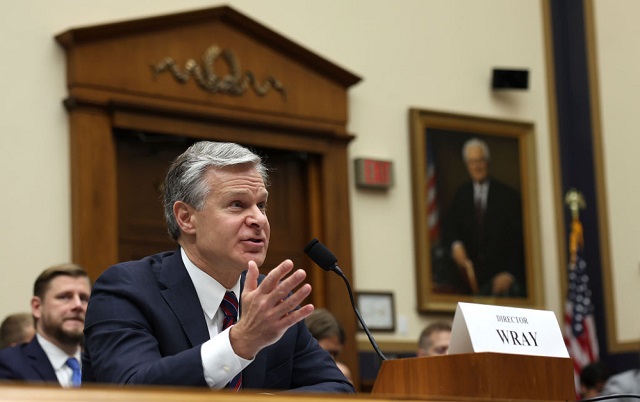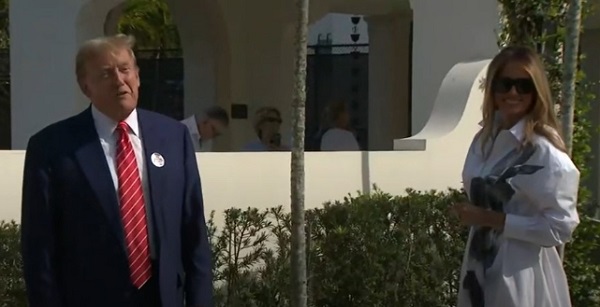International
FBI Director Christopher Wray uses Trump assassination attempt to attack encryption

FBI Director Christopher Wray testifies before the House Judiciary Committee
From LifeSiteNews
FBI Director Christopher Wray has used a congressional hearing organized after the assassination attempt on Donald Trump to launch another attack against encryption and use that as justification for the state of the investigation.
Appearing before the House Judiciary Committee last week, Wray was supposed to speak about the FBI’s investigation into this extremely serious incident, as well as about what the committee said is “the ongoing politicization” of the agency under his and Attorney General Merrick Garland’s direction.
But Wray turned it into blaming encrypted apps and services for the pace of the investigation. Quite extraordinarily for a person who is supposed to be highly knowledgeable about security, the FBI chief came across as oblivious to how essential encryption is for people’s online security – from their bank transactions to their communications.
Instead, he complained that it is difficult to break into accounts on encrypted platforms, that is, to break encryption – a situation that the FBI head said has “unfortunately become very commonplace.”
READ: Everything you need to know about the failed assassination attempt of Donald Trump
He went on to claim that law enforcement at all levels, federal, state, and local finds it “a real challenge.”
Reports say that the FBI had “early success” in breaking into the phone of the shooter, Thomas Matthew Crooks, using tools provided by Cellebrite. This is an Israeli company that oddly advertises its wares as “accelerating justice.”
Wray did not reveal which platforms host the accounts belonging to Crooks that the FBI says it has trouble accessing but noted that “legal process returns” are awaited to accomplish that goal.
And in the meanwhile, he told the Committee, U.S. law enforcement still doesn’t know why Crooks did what he did, implying that investigators are hampered by their inability to break encryption on apps, even though they have access to the shooter’s phone and laptop.
But, the “motive or ideology” that drove Crooks to attempt to assassinate Trump remains unclear, according to Wray. And he is strongly suggesting – always referencing encryption as the culprit – that this may remain so for good.
“Some places we’ve been able to look, some places we will be able to look, some places we may never be able to see, no matter how good our legal process is,” the FBI director told the committee.
Reprinted with permission from Reclaim The Net.
Business
Trump eyes end of capital gains tax in 2025

 MxM News
MxM News
Quick Hit:
In a historic announcement that rattled markets and reignited debate over tax policy, President Donald Trump revealed plans to eliminate the capital gains tax starting in 2025. The unprecedented move would allow Americans to retain all profits from asset sales—whether in stocks, real estate, or other investments. Supporters tout it as a bold pro-growth measure, while critics warn it may cause budget strain and market instability.
Key Details:
-
President Trump announced the elimination of capital gains tax effective 2025, describing it as a move to reward success and promote wealth-building.
-
Currently, capital gains are taxed at rates up to 20%, with additional surcharges for high earners.
-
The announcement caused a major rally across financial markets, though critics claim the change favors the wealthy and could disrupt the economy.
Diving Deeper:
At a press conference on Monday, President Trump laid out a sweeping proposal to eliminate the capital gains tax in its entirety, calling it a “long-overdue correction” to what he described as a punitive tax on prosperity. “Why should you be punished for building wealth?” he asked. “This is America—we reward success.” If enacted, the change would allow investors to retain 100% of profits from the sale of assets such as stocks, homes, and businesses, with zero tax liability.
This proposal marks a sharp departure from decades of entrenched U.S. tax policy. Currently, long-term capital gains are taxed at rates ranging from 0% to 20%, with potential surcharges including the 3.8% Net Investment Income Tax for high earners. Trump’s plan would zero out those liabilities entirely starting in the 2025 tax year.
Conservative economists and market analysts have lauded the move as potentially the most transformative supply-side reform since the Reagan era. They argue that removing the tax will unshackle trillions of dollars currently locked in unrealized gains, spurring investment, entrepreneurship, and broader economic dynamism. “This is a game-changer,” said one pro-growth advocate. “It sends a clear message that America is back to being the most investment-friendly nation on Earth.”
Predictably, left-wing critics erupted. One Democratic senator labeled the measure a “grenade” that would detonate the federal budget and widen the wealth gap. Others warned of asset bubbles and increased volatility as investors rush to dump assets ahead of the reform’s implementation. These concerns, however, do not seem to have spooked the markets—at least not yet.
The Dow Jones Industrial Average jumped nearly 600 points following the announcement, while cryptocurrencies surged on expectations of tax-free gains. Real estate portals and trading platforms like Robinhood and E*TRADE saw surges in activity as users began strategizing around the policy’s timing. Online, the announcement triggered a wave of memes and commentary. The hashtag #NoCapGains began trending on X (formerly Twitter), with some calling it a “wealth liberation act” and others denouncing it as “Robin Hood in reverse.”
Legislation to formalize the proposal is expected to hit Congress within weeks. While Republicans have largely expressed support, Democrats are preparing for a fierce battle. It’s unclear whether some establishment Republicans—many of whom have been resistant to bold reform under Trump—will help move the bill forward or slow-walk it in favor of more moderate compromises.
Until the law is officially passed, financial advisors are urging caution. “The promise of zero capital gains tax is tempting,” one planner said, “but don’t bet the farm until it’s signed, sealed, and delivered.”
Still, with the 2025 tax season approaching fast, the stakes are enormous. If passed, Trump’s plan would not only mark one of the most dramatic tax overhauls in modern history—it would redefine the very incentives that drive American investment and wealth accumulation.
International
UN committee urges Canada to repeal euthanasia for non-terminally ill patients

From LifeSiteNews
The UN Committee on the Rights of Persons with Disabilities has warned against Canada’s euthanasia program, urging the repeal of legislation that allows the killing of non-terminally ill individuals.
Canada’s euthanasia regime has become too radical even for the anti-life United Nations, who recently called on the nation to repeal its law allowing non-terminally ill patients to qualify for death through the state’s “Medical Assistance in Dying” program.
In closing remarks published March 21, the UN Committee on the Rights of Persons with Disabilities argued that Canada should repeal its 2021 MAID expansion legislation that allowed those who are chronically ill but not terminally ill to be put to death by the state.
The committee said that Canada’s regime “establishes medically assisted dying for persons with disabilities based on negative, ableist perceptions of the quality and value of the life of persons with disabilities, including that ‘suffering’ is intrinsic to disability rather than the fact that inequality and discrimination cause and compound ‘suffering’ for persons with disabilities.”
It pointed out that “the concept of ‘choice’ creates a false dichotomy by setting up the premise that if persons with disabilities are suffering, it is valid for the State Party to enable their death.”
In Canada, euthanasia is divided into Track 1 and Track 2 requests. Track 1 requests deal with those whose death is allegedly imminent or foreseeable. Track 2 requests deal with those who are not terminally ill but have lost the will to live due to their having chronic health problems.
The UN committee took specific issue with Track 2 MAID, writing that it is “extremely concerned about the 2021 amendments to the State Party’s Criminal Code through Bill C-7 that expanded the eligibility criteria for obtaining Medical Assistance in Dying (MAID), known as ‘Track 2’ MAiD by removing the ‘foreseeable death’ criteria.”
The committee further recommended that Canada not euthanize its citizens for mental health reasons and abandon additional expansions of the program. Such an expansion is slated to come into effect in 2027.
It is worth noting that while Track 2 cases of MAID are indeed evil, so are Track 1 cases. The Catholic Church infallibly teaches that euthanasia is a grave evil tantamount to murder and must be rejected in all circumstances.
The UN committee’s criticism of Canada’s euthanasia regime comes after many have pointed out that the regime has spawned a culture of death and eugenics in the country, with the disabled and the poor often being those who request or who are even suggested to request death via Track 2 MAID.
In one case, a Nova Scotia grandmother revealed that doctors repeatedly offered her euthanasia while she underwent cancer treatment, making her feel as though she was “better off dead.”
“I felt like a problem that needed to be [gotten] rid of instead of a patient in need of treatment,” she said. “I don’t want to be asked if I want to die.”
Similarly, in May of last year, LifeSiteNews reported on a Canadian man who felt “completely traumatized” and violated that he was offered MAID “multiple times” instead of getting the proper care he needed while in the hospital.
The most recent reports show that MAID is the sixth highest cause of death in Canada. However, it was not listed as such in Statistics Canada’s top 10 leading causes of death from 2019 to 2022.
When asked why MIiD was left off the list, the agency said that it records the illnesses that led Canadians to choose to end their lives via euthanasia, not the actual cause of death, as the primary cause of death.
According to Health Canada, in 2022, 13,241 Canadians died by MAID lethal injections. This accounts for 4.1 percent of all deaths in the country for that year, a 31.2 percent increase from 2021.
-

 Catherine Herridge1 day ago
Catherine Herridge1 day agoFBI imposed Hunter Biden laptop ‘gag order’ after employee accidentally confirmed authenticity: report
-

 International1 day ago
International1 day agoTrump’s ‘Golden Dome’ defense shield must be built now, Lt. Gen. warns
-

 2025 Federal Election1 day ago
2025 Federal Election1 day agoDon’t let the Liberals fool you on electric cars
-

 Crime1 day ago
Crime1 day agoFirst Good Battlefield News From Trump’s Global War on Fentanyl
-

 Courageous Discourse17 hours ago
Courageous Discourse17 hours agoEurope Had 127,350 Cases of Measles in 2024
-

 2025 Federal Election1 day ago
2025 Federal Election1 day agoLiberals Replace Candidate Embroiled in Election Interference Scandal with Board Member of School Flagged in Canada’s Election Interference Inquiry
-

 espionage2 days ago
espionage2 days agoU.S. Experts Warn Canada Is Losing the Fight Against PRC Criminal Networks—Washington Has Run Out of Patience
-

 Daily Caller2 days ago
Daily Caller2 days ago‘Drill, Baby, Drill’ Or $50 Oil — Trump Can’t Have Both





